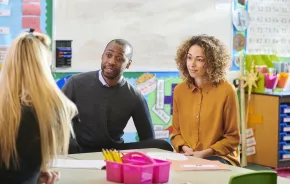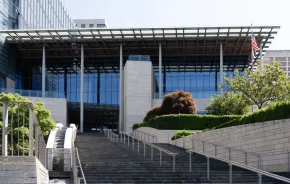
When I was a child, my dad regularly called his state representatives to voice his opinion. I recall hearing his voice rise and fall while I sat at the dining room table, the black rotary dial phone held tightly to his ear. My dad was a teacher, and I know many of those calls were about the state of education. While I advocate for my kids’ education within their school, I learned how to be an advocate for all the children of Washington state when I attended Stand for Children’s 2015 Legislative Summit on Feb. 7 in Tacoma.
Stand for Children Washington is a membership organization working to empower parents, elect courageous leaders, and advance public education. The group organizes statewide around issues affecting all students. Currently, the only local chapter is in Tacoma, where Stand also works on local district issues. Their yearly legislative summit aims to educate attendees on this session’s issues that affect our public education system and to teach participants how to be effective advocates. Our state’s legislative session started Jan. 12 and is supposed to end on April 26. It’s likely, though, that Gov. Jay Inslee will call a special session or two depending on whether a state budget compromise is reached and that will end in June or July, says Stand’s Executive Director Dave Powell.
The first part of the morning included a brief overview of Stand’s 2015 legislative priorities (which may change as bills move through the legislature):
- Funding: Washington state spends roughly half its budget on education. Due to the McClearly Lawsuit that found the state failed to properly fund public education, the Legislature must meet the court’s mandate for increased funding by 2018. Stand aims to make sure this funding supports policies that favor student outcomes, equity and transparency.
- Restore Washington state’s waiver from No Child Left Behind and regain local control over nearly $40 million for low-income students by including student scores on state tests as one measure of many in teacher performance evaluations.
- Pass the Early Start Act to sustain and grow Early Achievers, a high-quality early childhood system that makes it easy for parents to make informed decisions about their child’s early education.
- Expand Washington’s high-quality pre–K program for at-risk 3- and 4-year olds, the Early Childhood Education and Assistance Program (ECEAP).
- Support the implementation of Common Core State Standards, Next Generation Science Standards, SmarterBalanced exams and Academic Acceleration.
- Maintain and strengthen Washington’s Charter School Act to provide families with more high-quality public school options.
When we feel overwhelmed as parents and unsure of how to become involved, we can think about picking just one or two ways to be an advocate at the moment. Anyone can enroll in Stand University for Parents, a six-week program help people successfully lead children to success from elementary school through college, but below Powell shared his simple steps to becoming an involved advocate for education:
- Find out who your legislators are and engage them in person, by phone or mail.
- Attend school board meetings.
- Stay abreast of the education issues of the day by signing up for updates from Stand for Children or partner advocacy organizations.
- Read the education blogs.
- Sign up for newsletters from the various advocacy organizations such as Stand, League of Education Voters, etc.
“The biggest thing to remember is legislators want to hear from their constituents so people shouldn’t feel intimidated contacting them. Talk to them like you would a neighbor about what’s important to you; they are members of your community after all,” says Powell.
I must admit after spending six hours thinking about the politics involved in education, I went home a little disillusioned. After hearing detailed description of how little money there actually is to meet the educational needs of our children, I asked Powell why I should be excited about becoming a better advocate.
“State and local politics are different than federal politics, which I think is most people’s primary frame on politics. At the state level, the scope and scale is much smaller and a very small group of people can make change happen. For example, in 2013 Stand for Children worked at the state and local level to adopt and fund Academic Acceleration in Tacoma, which automatically enrolls prepared students into college credit bearing courses. The Tacoma School Board adopted the policy and we secured $2 million for a grant program to support districts that adopt the program. This work was accomplished through only a few dozen advocates and community leaders working together. This year in Tacoma, 57 percent of students are enrolled in college credit bearing courses as opposed to only 34 percent last year,” he says.
With his words, I remember the feeling of power that existed in some of the sessions I attended in early February. Roz Jenkins of The Parents Union talked about the positive side of the much beleaguered Common Core Standards. Tacoma Organizer Sara Irish handed out simple to follow primer sheets on advocacy. Susan Barbeau, the executive director of First 5 FUNdamentals, talked about great strides that are being made in early childhood education. That famous quote by Margaret Mead about a small group of individuals creating change, deep down I know it is true. I may have an iPhone instead of a black rotary dial like my dad had in our childhood home, but I surely can learn to dial it as often as my dad did when I was a student.











